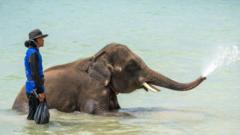Local authorities have charged the elephant's handler, bringing attention to the ethical concerns surrounding the treatment of elephants in Thailand’s tourism sector.
Tragedy Strikes Thailand: Spanish Tourist Gored to Death by Elephant

Tragedy Strikes Thailand: Spanish Tourist Gored to Death by Elephant
A Spanish tourist's life was cut short during an elephant interaction in southern Thailand, raising alarms over animal tourism safety.
Article:
A tragic incident unfolded in southern Thailand as a mahout faces charges following the death of a 22-year-old Spanish tourist, Blanca Ojanguren García, who was gored by an elephant in his care. The handler, Theerayut Inthaphudkij, 38, has been charged with negligence causing death, according to Thai police.
The fatal encounter took place at the Koh Yao Elephant Care Centre, where García was bathing the 45-year-old female elephant named Phang Somboon. Reports indicate she suffered a head injury from the elephant's tusk and later succumbed to her injuries in the hospital. Her boyfriend, who was present at the scene, witnessed the harrowing event.
This incident has reignited concerns regarding the ethics of elephant tourism in Thailand, where approximately 3,000 elephants are housed in various tourist attractions. Animal rights groups have long criticized such practices as both dangerous and unethical. Critics argue that activities like elephant bathing disrupt natural grooming behaviors, potentially causing harm to the elephants and exposing them to undue stress.
After the attack, experts suggested that the elephant’s aggressive behavior could be attributed to stress resulting from its interaction with tourists. In response to García's death, People for the Ethical Treatment of Animals (Peta) emphasized that such incidents underscore the risks posed to both human lives and the welfare of animals involved in these tourist activities. Peta's senior vice president, Jason Baker, stated, "Any 'sanctuary' that allows human interactions with elephants is no place of refuge."
This isn't the first time a mahout has faced negligence charges in the wake of a tourist's injury or death from elephant interactions. In 2017, a mahout and camp owner were charged after an elephant killed a Chinese tour guide and injured two other tourists. More historically, in 2013, an elephant that fatally attacked a woman had its tusks cut following the incident.
García was studying law and international relations at Spain's University of Navarra and was partaking in a student exchange program in Taiwan before her trip to Thailand, which began on December 26, 2024. Spain's foreign minister, José Manuel Albares, noted that the Spanish consulate in Bangkok is currently providing support to García's family. As discussions continue about the future of Thailand’s animal tourism industry, the tragic death of García serves as a grim reminder of the complexities and inherent risks involved in such practices.
A tragic incident unfolded in southern Thailand as a mahout faces charges following the death of a 22-year-old Spanish tourist, Blanca Ojanguren García, who was gored by an elephant in his care. The handler, Theerayut Inthaphudkij, 38, has been charged with negligence causing death, according to Thai police.
The fatal encounter took place at the Koh Yao Elephant Care Centre, where García was bathing the 45-year-old female elephant named Phang Somboon. Reports indicate she suffered a head injury from the elephant's tusk and later succumbed to her injuries in the hospital. Her boyfriend, who was present at the scene, witnessed the harrowing event.
This incident has reignited concerns regarding the ethics of elephant tourism in Thailand, where approximately 3,000 elephants are housed in various tourist attractions. Animal rights groups have long criticized such practices as both dangerous and unethical. Critics argue that activities like elephant bathing disrupt natural grooming behaviors, potentially causing harm to the elephants and exposing them to undue stress.
After the attack, experts suggested that the elephant’s aggressive behavior could be attributed to stress resulting from its interaction with tourists. In response to García's death, People for the Ethical Treatment of Animals (Peta) emphasized that such incidents underscore the risks posed to both human lives and the welfare of animals involved in these tourist activities. Peta's senior vice president, Jason Baker, stated, "Any 'sanctuary' that allows human interactions with elephants is no place of refuge."
This isn't the first time a mahout has faced negligence charges in the wake of a tourist's injury or death from elephant interactions. In 2017, a mahout and camp owner were charged after an elephant killed a Chinese tour guide and injured two other tourists. More historically, in 2013, an elephant that fatally attacked a woman had its tusks cut following the incident.
García was studying law and international relations at Spain's University of Navarra and was partaking in a student exchange program in Taiwan before her trip to Thailand, which began on December 26, 2024. Spain's foreign minister, José Manuel Albares, noted that the Spanish consulate in Bangkok is currently providing support to García's family. As discussions continue about the future of Thailand’s animal tourism industry, the tragic death of García serves as a grim reminder of the complexities and inherent risks involved in such practices.


















